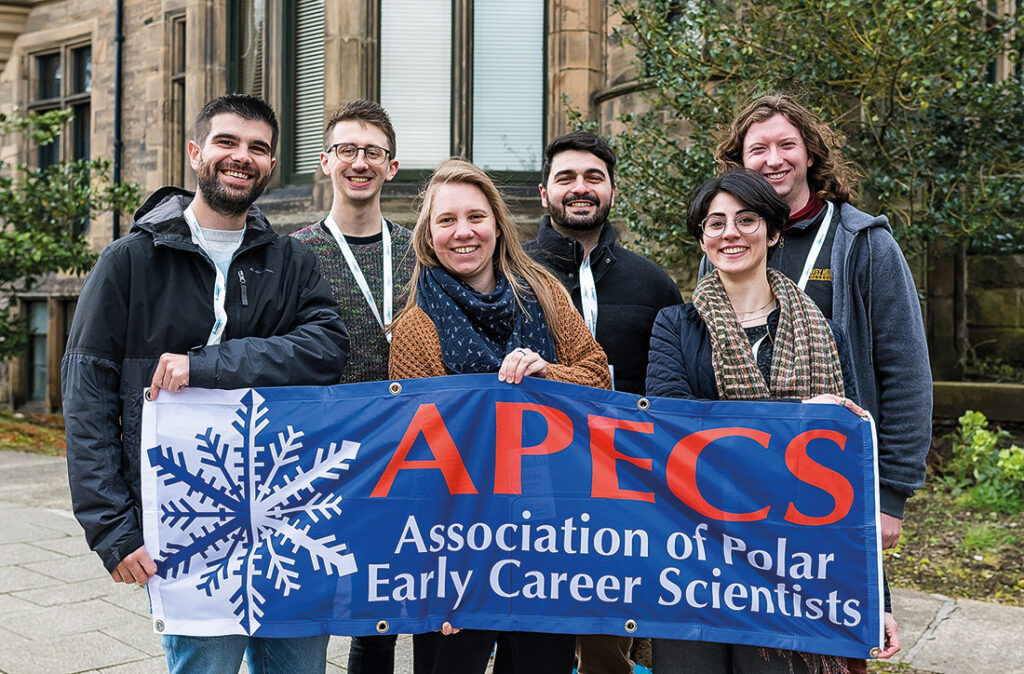© Sue Novotny / WWF
Early career researchers
Shaping the frozen frontier
Early career researchers play a crucial role in understanding and addressing the evolving challenges related to the frozen realms of our planet, the cryosphere. Members of the executive of the ASSOCIATION OF POLAR EARLY CAREER SCIENTISTS (APECS) share some of their contributions and initiatives—and why their voices and work matter to the future of the cryosphere.
The cryosphere encompasses various forms of frozen water and water-related features, including sea, lake and river ice, snow cover, glaciers, ice sheets, and permafrost. But increasing air temperatures are altering these frozen landscapes, leading to permafrost thaw, declining sea ice, and glacier retreat.
These developments highlight the important role of the cryosphere in our global climate system. Studying it requires the use of diverse research techniques across the fields of geophysics, Earth system science, social science and more.
Buoyed by peer-to-peer support and organizations seeking their perspectives, early career researchers like us have the potential to contribute significantly to scientific studies and foster collaborations across the cryosphere research communities.
Networking, sharing, collaborating
The opportunity to explore the pristine environments of the cryosphere has expanded in step with new technologies that enable us to collect critical data. Early career researchers, including APECS members, are harnessing these tools to drive fundamental cryosphere research.
Studies indicate that compared to senior researchers, researchers those who are just starting out in their chosen fields are more adept at incorporating multidisciplinary perspectives into their work. They are also more likely to participate in networking activities, where they can forge connections with peers across diverse disciplines. These collaborations facilitate the exchange of ideas, encourage interdisciplinarity, contribute to the development of new strategies, and can help integrate Indigenous knowledge. It’s an approach that also enriches the contribution and review process when it comes to answering key scientific questions.
As future leaders at the early academic stages (whether at the masters, doctorate or postdoc level), we are uniquely positioned to witness and be affected by changes in the cryosphere. Drawing on our experiences, we play a crucial role in applying scientific knowledge to policy-making with a more eco-friendly approach.
© Page Chichester / iStock
APECS MEMBERS MAKING A DIFFERENCE IN THEIR FIELDS
- Early career researchers specializing in the cryosphere:
have actively contributed to assessing Intergovernmental Panel on Climate Change reports since 2018, resulting in multiple publications. - organized a Cryosphere Pavilion session at COP 28 titled “Youth in the Poles: The Role of ECRs in Preserving the Cryosphere.”
- submitted an information paper to the 2023 Antarctic Treaty Consulta- tive Meeting—the primary forum for discussing Antarctic policy, science and logistical issues—with the support of several delegations.
- led a recent PLOS Climate collection featuring opinion and review papers on a wide range of topics.
- actively participate and collaborate in the International Arctic Science Committee, the Scientific Committee on Antarctic Research, the Climate and Cryosphere of the World Climate Research Program, and the Southern Ocean Observing System.
- have conducted globally recognized initiatives, such as Antarctica Day and Polar Weeks, to raise awareness about climate change and the significance of polar regions
Providing a voice for early career polar researchers
Since the fourth International Polar Year (2007–08), APECS has played a key role in amplifying the voices of early career researchers and elevating our visibility among our research peers. It provides a unique platform for nearly 5,000 researchers from more than 80 countries and fosters opportunities for innovative, international, interdisciplinary collaborations among them. It recruits, retains and promotes the next generation of polar and cryosphere enthusiasts.
The association has also organized online conferences, world summits, and sessions at scientific conferences to better address the needs of early career researchers in polar and cryosphere sciences. For example, APECS was present at the One Planet – Polar Summit in Paris in November 2023 and the Polar Symposium in Monaco in February 2024.
As early career researchers, we have the skills to incorporate science into multidisciplinary approaches to tackle cryosphere changes, promote collaboration with policy-makers, and encourage public action. As trailblazers leading these discussions, we have the potential to inspire innovative thinking and bring about lasting positive changes in our communities for a better environment.
We are the generation tasked with addressing the critical challenges facing the cryosphere and the Arctic, so our role holds immense significance for the future of the planet. The impacts of climate change on frozen landscapes are undeniable, with permafrost thaw, declining ice cover, and glacier retreat being just a few examples. These changes affect local ecosystems and communities, but also have far-reaching implications for global climate systems.
Our generation must take proactive steps to mitigate these effects, using our multidisciplinary perspectives and innovative approaches to drive scientific research, inform policy-making, and inspire public action. By harnessing our collective expertise and leveraging platforms like APECS to amplify our voices, we can lead the way towards sustainable solutions that protect the integrity of the cryosphere and ensure a healthier planet for generations to come.
ASSOCIATION OF POLAR EARLY CAREER SCIENTISTS (APECS)

© Association of Polar Early Career Scientists (APECS)
This article was contributed by the following early career cryosphere researchers (shown from left to right):
- JOSÉ QUEIRÓS, University of Coimbra, Portugal
- WILLIAM DAVID HARCOURT, University of Aberdeen, UK
- LINA MADAJ, Vrije Universiteit Amsterdam, the Netherlands
- HUGO GUÍMARO, University of Coimbra, Portugal
- DENIZ VURAL, Alfred Wegener Institute Helmholtz Centre for Polar and Marine Research, Germany
- RYAN O’HARA, Harvey Mudd College, US
- GWENAËLLE GREMION, Université du Québec à Rimouski, Canada (absent from photo)
By WWF Global Arctic Programme